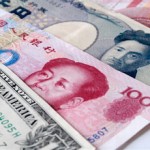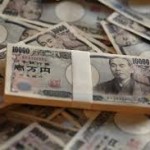Yen Weakens for Second Day as Stocks, Oil Rally; Aussie Advances

The yen fell for a second day against the dollar as stocks rose around the world before U.S. reports this week that economists said will show an improving labor market.
Japan’s currency also weakened versus all of its 16 major counterparts as a rally in crude oil prices reduced demand for haven assets. The dollar strengthened for a fifth day against the euro amid signals the Federal Reserve is moving toward raising interest rates. Australia’s currency gained after building approvals unexpectedly increased in November. Malaysia’s ringgit rose for the first time in five days.
“The decline in oil has stopped and stocks are being bought back along with the dollar as risk aversion dissipates,” said Akira Moroga, manager of currency products at Aozora Bank Ltd. in Tokyo. “The dollar could recover to 120 yen if market sentiment stays positive.”
The yen fell 0.4 percent to 119.74 per dollar at 2:27 p.m. in Tokyo after sliding 0.7 percent yesterday. Japan’s currency weakened 0.3 percent to 141.55 per euro. The dollar gained 0.2 percent to $1.1821 per euro after advancing to $1.802 yesterday, the strongest since January 2006.Aussie
The MSCI Asia Pacific Index (MXAP) of shares jumped 1.3 percent after the Standard & Poor’s 500 Index (SPX) rose 1.2 percent yesterday. Crude oil has rallied more than 4 percent to $48.86 a barrel since falling to $46.83 yesterday, the lowest since April 2009.
Dollar Index
“We have a dollar-yen forecast of 132 by the end of this year,” Sue Trinh, senior currency strategist at Royal Bank of Canada in Hong Kong, said in a Bloomberg Television interview. “Layers of yen weakness” include the movement of assets held by the Government Pension Investment Fund into overseas holdings away from Japanese bonds, she said.
The Bloomberg Dollar Spot Index, which tracks the U.S. currency against 10 major peers, climbed 0.1 percent to 1,146.63, set for the highest close in data going back to 2004.
Initial claims for U.S. jobless benefits fell to 290,000 last week, from 298,000 the previous week, according to a Bloomberg News survey before today’s report. Employers added 240,000 workers in December, after hiring 321,000 in November, a separate survey showed before the figure is released tomorrow.
“Over 2015 and through 2016, we have an investment strategy of being broadly long of U.S. dollars,” RBC’s Trinh said, referring to a bet the currency will gain. “That will get more legs, especially as the first Federal Reserve rate hike comes onto the radar.”
The Fed will increase its benchmark interest rate in about eight months, based on data compiled by Morgan Stanley, compared with a prediction of 13 months in October.
Aussie Advances
Australia’s dollar rose against all its 16 major peers after the Bureau of Statistics said building approvals climbed 7.5 percent in November. Economists surveyed by Bloomberg predicted a decrease of 3 percent.
The Aussie gained 0.4 percent to 81.08 U.S. cents after sliding to 80.33 yesterday, the weakest since July 2009.
The ringgit halted a four-day, 2.4 percent slump as stocks and oil rallied. The currency was also boosted after a report yesterday showed the trade surplus climbed to the highest in three years.
“The specific catalyst in terms of why the ringgit’s a little bit stronger is that the trade balance came out a little bit better than expected,” said Mirza Baig, head of foreign-exchange and interest-rate strategy at BNP Paribas in Singapore.
The ringgit strengthened 0.4 percent to 3.5686 per dollar after depreciating to 3.5862 yesterday, the lowest level since July 2009.
Source: Bloomberg – Yen Weakens for Second Day as Stocks, Oil Rally; Aussie Advances




























